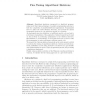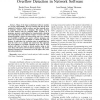2074 search results - page 390 / 415 » Using an Object Reference Approach to Distributed Updates |
115
click to vote
BDIM
2007
IEEE
15 years 8 months ago
2007
IEEE
Utility services providers offer on-demand services for multiple users and applications from a shared resource pool. The utility computing environment provider manages resources th...
121
click to vote
EUROPAR
2007
Springer
15 years 8 months ago
2007
Springer
Abstract. Algorithmic skeletons correspond to a high-level programming model that takes advantage of nestable programming patterns to hide the complexity of parallel/distributed ap...
137
Voted
COMSWARE
2006
IEEE
15 years 8 months ago
2006
IEEE
Many of the bugs in distributed software modules are security vulnerabilities, the most common and also the most exploited of which are buffer overflows and they typically arise in...
107
click to vote
EUROPAR
2001
Springer
15 years 6 months ago
2001
Springer
Distributed-system observation tools require an efficient data structure to store and query the partial-order of execution. Such data structures typically use vector timestamps to...
132
click to vote
ACCV
2007
Springer
15 years 6 months ago
2007
Springer
In dynamic scenes with occluding objects many features need to be tracked for a robust real-time camera pose estimation. An open problem is that tracking too many features has a ne...


